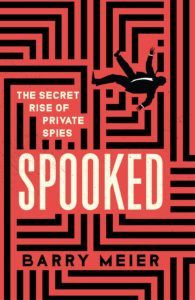Reviewer: Dr John Battersby
Review published in National Security Journal, 19 August 2021
Download full PDF version – Book Review – ‘Spooked: The Secret Rise of Private Spies’ (147 KB)
Barry Meier, Spooked: The Secret Rise of Private Spies, Sceptre (London 2021), 292 pages.

This book is not the easiest of reads, not the author’s fault – the topic is labyrinthian. This book does not provide a single lineal narrative – it shines a light on a range of private intelligence organisations and their activities for wealthy, often up-to-no good, clients. A central theme running through the book is the infamous Christopher Steele dossier which supposedly exposed lewd, illegal and untoward activity by Donald Trump and others associated with his campaign and their connections to Moscow. The book traces the life span of the dossier, discusses its shadowy source(s), exposes its fundamental flaws, but leaves the possibility – like all great myths – that perhaps something of the Steele dossier is true. This book reinforces an ancient tenet – do not believe anything anyone tells you, unless you have checked it, verified it and applied the common-sense test to it. This includes what you read in the mainstream media.
Private Investigators have always existed, and they have worked in a loosely regulated world of collecting information on people. But Meier’s book does not focus on gumshoes, but on the deliberately established high-end intelligence gathering organisations (possibly better described as professional muckrakers) who hawk their wares for big money, for clients vetted only on the depth of their pockets. These organisations, often in league with lawyers who can claim legal privilege for the information collected, have worked to find damaging information on the accusers of Harvey Weinstein and to find out what groups such as Greenpeace are up to by infiltrating them. Such organisations were employed by Trump campaigners to gather information on Clinton and vice-versa, and they have commonly been employed for decades in similar roles. Meier discusses not just politicians and their use of private spies, but big industry players, as well as the criminal underworld.
The life blood of these organisations are the highly trained ex-intelligence operatives of the world’s major intelligence agencies. These are the one-time good guys who have gone private and are cashing in on the world of information supply to those who will pay almost anything for the type of information they want. Along with ex-intelligence operators are former investigative journalists and lawyers, all grown-up in professions with ethical frameworks within which their work is done. However, those ethical frameworks were probably always malleable, and Meier’s account suggests these frameworks quickly melt entirely once people enter the private intelligence world.
Intelligence operations run by private intelligence organisations involve outright theft, hacking, offensive cyber operations, the use of bots, the spreading of disinformation, espionage, paying and turning insiders and the infiltration of undercover operatives into organisations to spy on their activities. If they cannot find what they are looking for, then they can and have fabricated the information their clients want to hear. While it seems like intelligence operators who go private convert to the ‘dark side’, it leaves a question – how much of what they did before really was telling truth to those in power? How much involved telling only what the powerful would listen to? Is the clearly morally defunct world of private intelligence actually much divorced from its state-run predecessor?
Meier also constantly reminds the reader that private intelligence organisations do not live in an isolated eco-system. They constantly interact with government intelligence agencies, where the principle (if it is ‘principle’) of ‘plausible deniability’ allows public agencies to get done what they cannot do themselves. Both private spy and private client rely on lawyers as intermediaries, as the covert link and circuit breaker between them. Finally, muckraking cannot be done without the persistent journalistic desire for a scoop transforming the muck into copy and clickbait.
Meier concludes with suggestions on what could be done to clean up the private spying industry, and these sound credible and sensible steps to take. These suggestions also sound forlorn and unlikely, and so Meier’s achievement will not be in finding a new and better way forward; it is in warning us of the shortfalls of the ‘information’ available to us in the 21st century.
For those who are interested and want to be informed about what they are reading in today’s media and curious about how it got there, Spooked is definitely a worthwhile read.
By John Battersby
Centre for Defence and Security Studies
Massey University
_________________
